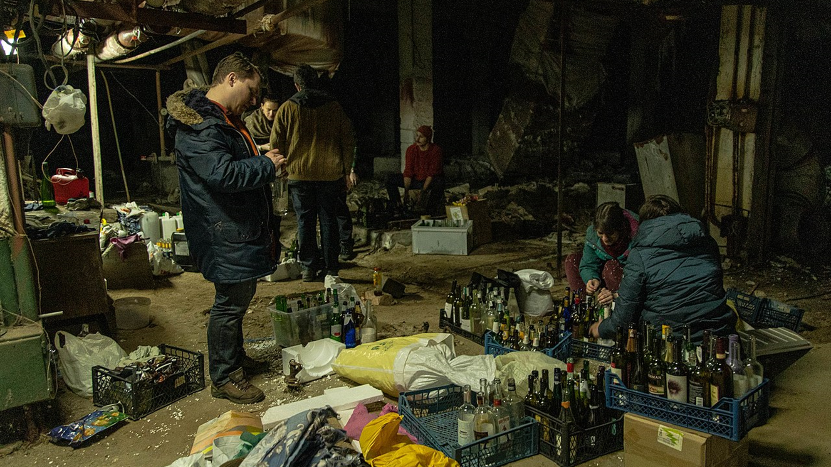“Every gun that is made, every warship launched, every rocket fired, signifies in the final sense a theft from those who hunger and are not fed, those who are cold and not clothed.” – Dwight D. Eisenhower
A safety professional I know recently looked at the photo above and commented, “Does that look safe?”
Any process safety professional looking at this photo of Ukrainian civilians making Molotov cocktails would have to acknowledge that it doesn’t meet even the minimum process safety requirements of a manufacturing process involving flammable liquids. None, however, should condemn it. After all, there are bigger things at stake for these people than personal safety. Not when their brothers, sons, and fathers are out fighting and dying in a battle against an invading Russian army.
There is a phrase that appears frequently in corporate safety visions: “Nothing we do is worth getting hurt for.” In times of peace, in developed industrial countries with resources, this is certainly true. When the times change, however, so does what is worth getting hurt for.
Societal Expectations Set the Standards for Safety
Here at Bluefield Process Safety, we have four core principles:
- Nothing is perfect.
- Resources are finite
- Life and health are valuable.
- Societal expectations set the standards for safety.
To expand on the fourth principle, society tells us how safe we must be. “Sometimes those expectations are in the form of regulations, sometimes not. Individuals and organizations are about a safe as society expects. As time goes by, as life spans increase, society’s expectations will increase. Individuals and organizations must get safer with time to keep up with or ahead of these expectations. We cannot judge the past by today’s standards, nor can we judge today by the standards of the past.”
This explanation does not anticipate society’s expectations for safety decreasing, but in times of war, they may.
War and Safety in the United States
OSHA came into being in 1970, during the Vietnam War. At the time, the United States was experiencing around 14,000 work-related fatalities per year, and 2½ million disabling injuries per year. That compares to 58,228 Americans killed and 153,452 Americans wounded during the entire course of the Vietnam war. When Congress recognized that going to work here at home was more dangerous than going to war, there was bipartisan support for the creation of OSHA and the Occupational Safety and Health Act was signed into law by a Republican president.
This is not the only time that American wars influenced are attitude about safety. Following the American Civil War (1861 – 1865), the first of America’s industrial wars, soldiers returned home, many to work in the factories that marked the new industrial revolution. There they suffered the same kinds of devastating disabling injuries that many of their comrades suffered during the Civil War. This similarity is what led many states to pass laws about workplace safety following the Civil War.
What these societal movements toward higher expectations for workplace safety have in common, though, is that they were removed from the wars themselves. It was the comparison to war that led us to demand greater safety. While in the midst of a war, the immediate needs of the moment get our full attention.
Safety Is an Investment
I was once talking to friend, an expert in poverty, about the choices that poor people make that seemed so costly to me, so detrimental to long-term success. She explained, “It’s hard to worry about the future when don’t know where your children’s next meal is coming from.”
Safety experts often observe that “Safety is an investment, not an expense.” Investments, however, require faith in the future, faith that there is a future. In times of war, especially in times of total war, such as the people of Ukraine are now experiencing, faith in the future is seriously eroded. Safety no longer seems like an urgent need, but a luxury to be pursued in better times.
We Owe It to Others
Here in the United States, and throughout the industrialized world, we are living in a time of peace and prosperity. Sure, gasoline prices have spiked above their relatively historic lows, the Covid-19 pandemic continues to hamper our ability to go about normal social activities, and politics now is almost as divisive as it was during the nineteenth century. But we have resources and reason to have faith in the future. So, workplace safety is something that deserves our continued focus. We owe it to those who don’t.
Let’s Not Judge, But Act
The people of Ukraine are now ignoring many of the safety rules that they followed before the Russian invasion. They have new priorities; the term “safety rule” has taken on a whole new meaning. The same is for people in all war-torn areas of the world. Let’s not judge them. They will get back to standards we are all so familiar with when their faith in the future is restored.
In the meantime, for those of us who are not under attack, but live and work with resources available to us, let’s use those resources to make our world a safer place. We know what to do, and there is no excuse for us not to do it.
